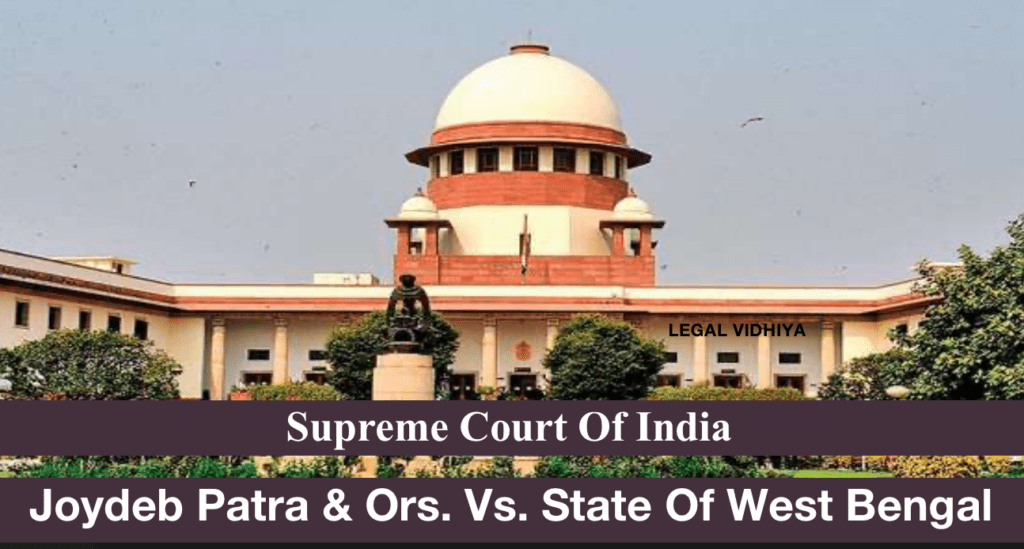
| Case Number | Criminal Appeal no. 203 of 2007 |
| Date of Judgment | March 06, 2013 |
| Court | Supreme Court of India |
| Appellant | Joydeb Patra & Ors. |
| Respondent | State Of West Bengal |
| Bench | A.K. Patnaik and Sudhansu Jyoti Mukhopadhaya, JJ |
| Issue | Evidence Act- Section 106 IPC- Section 34,302 |
| Citation | 2013 (1) ACR 985, AIR 2013 SC 2878, 2013 (3) AJR 310, 2013 CriLJ 2729, 2013 (3) JCC 1799 |
Facts of the Case:
- The case, Criminal Appeal No. 203 of 2007, was brought before the Supreme Court of India as an appeal against the judgment of the Division Bench of the Calcutta High Court dated 28.07.2006.
- The case revolved around the death of Madhabi Patra, who was married to Joydeb Patra (Appellant no. 1). Madhabi was pregnant, and a ceremonial function called ‘Sadh’ was arranged on 18th Baisak, 1393 B.S. During this function, Madhabi fell ill, and her condition deteriorated rapidly, leading to her death later that night.
- The prosecution alleged that Madhabi died due to poisoning administered through the food she consumed during the ceremony.
- Appellant No. 1 (Joydeb Patra), his father, brother (Appellant No. 2), sister (Appellant No. 3), and mother (Appellant No. 4) were charged and convicted under Section 302/34 of the Indian Penal Code (IPC) for their involvement in Madhabi’s death.
Issues of the Case:
- The primary issue was whether the appellants were guilty of causing Madhabi Patra’s death by administering poison, as alleged by the prosecution.
- Another issue pertained to the burden of proof, particularly whether the burden was on the prosecution to establish the guilt of the accused beyond reasonable doubt or if the accused had a duty to prove their innocence.
Arguments of the Petitioner (Appellants):
- The appellants contended that there was insufficient evidence to prove that Madhabi died due to poisoning. They pointed to the fact that the post-mortem report did not specify the cause of death, and the Chemical Examiner’s report did not detect any poison in Madhabi’s viscera.
- The appellants argued that the burden of proof rested solely on the prosecution, and since the prosecution failed to establish beyond reasonable doubt that poison was administered, their conviction should be overturned.
- They claimed that their explanation for the suspicious circumstances surrounding Madhabi’s death had been rejected without valid reasons.
Arguments of the Respondent (State of West Bengal):
- The State argued that the death occurred in the appellants’ house under mysterious circumstances. They contended that given the availability of medical facilities nearby, the appellants should have sought medical help for Madhabi, but they did not, raising suspicions about their involvement.
- The prosecution maintained that the burden of proving innocence rested on the appellants, as the death took place within their premises and under their care. They argued that the appellants’ failure to explain the circumstances adequately justified their conviction.
Judgment of the Case:
- The Supreme Court, after careful consideration of the evidence, concluded that there was no conclusive evidence to establish that Madhabi’s death was caused by poisoning.
- They noted that the postmortem report did not specify the cause of death, and the Chemical Examiner’s report found no poison in Madhabi’s viscera.
- The Court emphasized that the burden of proving guilt beyond reasonable doubt lay with the prosecution and that this burden had not been met.
- They cited precedents that clarified that the burden of proof remained with the prosecution and that the accused could only be expected to offer an explanation if the prosecution had successfully proved its case.
- As the prosecution had failed to establish poisoning as the cause of death, the foundation of their case collapsed.
- Therefore, the Supreme Court allowed the appeal, set aside the judgments of both the High Court and the Trial Court, and directed that the appellants’ bail bonds be discharged.
In summary, the case revolved around the death of Madhabi Patra, with the prosecution alleging poisoning by the appellants. The Supreme Court found insufficient evidence to support this claim and emphasized that the burden of proof lay with the prosecution, which had not met that burden. Consequently, the appellants’ convictions were overturned, and they were acquitted.
REFERENCES
Written by ADITYA SINGH, UNIVERSITY OF LUCKNOW an intern under Legal Vidhiya.




0 Comments